The golden rule states that you should do unto others, as you would like them to do unto you. The flipside of that is that you shouldn’t do unto yourself something you wouldn’t do unto others. And that is where almost all of us fail. In this post I’ll show why the simple act of being kinder to yourself is the only way to getting permanently free from acne.
If you have ever dealt with acne, you know that “frustration” is but one of the things this skin condition can make you feel. It can also inspire a host of other feelings—sadness, embarrassment, anger, even hopelessness—all negative. Acne can cause you to feel poorly about your body image, and this negative perception of body image can have a devastating impact on your self-image as a whole. With all the negativity it can create, acne has the power to be incredibly stressful. The ironic problem here is that all this stress that having acne causes us to feel could actually be making the acne worse.
The stress connection
The impact of stress on acne has been well-documented over time, to the extent that a time of heightened stress causing breakouts has become almost a cliché. However, this is one cliché with a distinct basis in truth: according to research published in Seminars in Cutaneous Medicine and Surgery, inflammatory skin disorders such as acne and psoriasis can be worsened by experiencing stress (Huynh, Gupta, & Koo, 2013).
The stress causes an imbalance of a hormone called cortisol, which can impact health in many ways, including the further aggravation of existing skin problems (Breines, et al., 2015). So, stressing out over a given life situation can bring on a breakout—and stressing over the breakout can bring on worsened acne. This creates a vicious cycle of stress-acne-stress that does absolutely no good for anyone. In fact, the stress and the acne only serve to make each other worse, and make you miserable in the process.
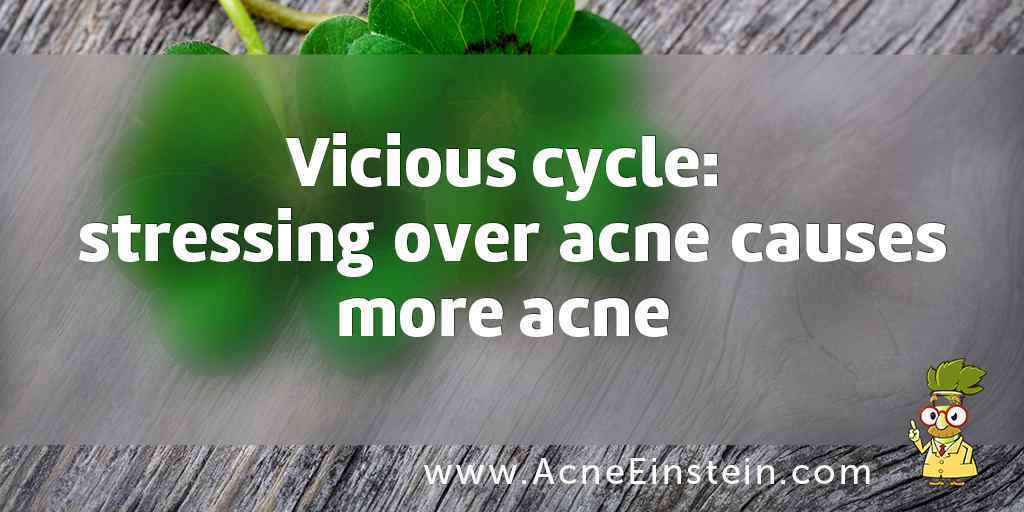
This doesn’t mean that you are doomed to a life of unhappiness and ever-worsening acne, however—and this time, the “cure” doesn’t reside in a bottle of pills, a container of toner or a bottle of cream. There’s no “snake oil” remedy to buy, no “acne-fighting cleansing system” to subscribe to. You can improve the way you perceive and cope with stress without paying any money—and thus, increase the odds of improving your skin condition—simply by exercising some self-compassion.
Self-compassion: what is it?
Self-compassion is the act of feeling the same empathy for yourself that you extend toward other human beings. Many of the world’s most empathetic people fail to see themselves as worthy of the same compassion they so willingly extend to others, viewing themselves as separate from the rest of humanity with regard to deserving empathy and compassion.
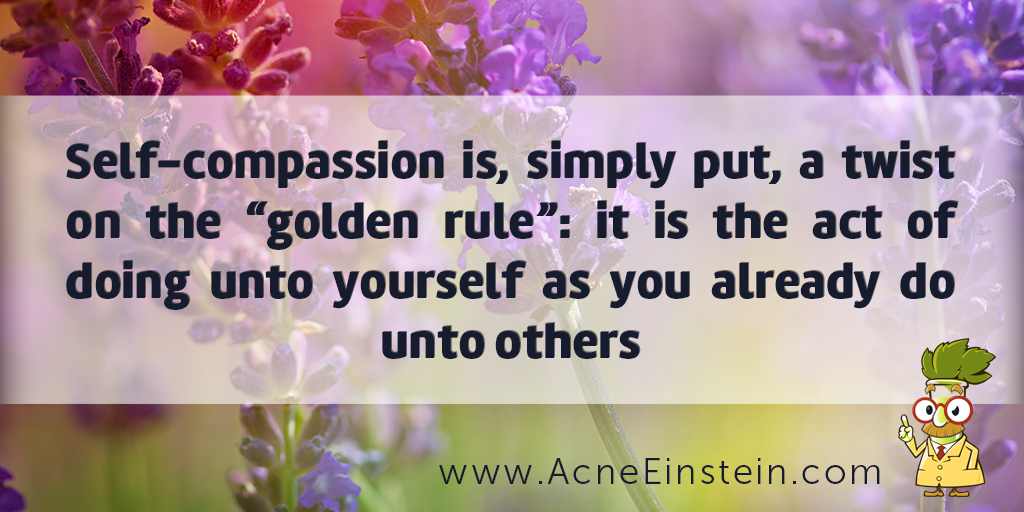
Often, social norms dictate that we should be other-focused rather than self-focused, and that focusing in any way on the self is the same as being self-centered, and that being compassionate to the self is synonymous with being self-pitying. However, self-compassion is not a practice only for self-absorbed people throwing themselves a proverbial “pity party.” Self-compassion is, simply put, a twist on the “golden rule”: it is the act of doing unto yourself as you already do unto others.
The three tenets of self-compassion put forth by Dr. Kristin Neff are self-kindness, common humanity, and mindfulness. By utilizing these three key components of self-compassion in your daily life, you can reduce your stress levels (Bluth, Roberson, & Gaylord, 2015), improve your self-image, and even improve the appearance of your skin.
How self-compassion can help people with acne
People have a tendency to place demands on themselves that they would never even think of placing on others, such as the demand for perfection. Yet, even as they make these unrealistic demands of themselves, they refuse to show themselves the compassion that they would readily show a fellow human being.
People with acne are no exception to this. Often, people who have acne are striving for an unattainable goal: flawless skin. However, no one alive has truly perfect skin, and everyone you see in the media with skin that appears perfect is either wearing pancake make-up to hide their minor flaws, or is Photoshopped to appear flawless.
Get out of the “I need to do more” trap
Another fallacy that often plagues people with acne is the idea that if they only did something more, they could achieve the ideal of perfection that they have in their minds. This may lead some people down the natural health path, which appears positive on the surface, but can give rise to extremely negative outcomes. Many of the ideas put forth by proponents of “natural healing” are based in the idea that skin conditions like acne are caused by some form of toxicity that must be purged in order to “purify” the body.
Strict elimination diets lead to feelings of failure
For people who are genetically predisposed toward having acne, this can lead to a dangerous mindset that results in equally dangerous behaviors. For example, in the quest for bodily purity, a person with acne might deprive him or herself of various types of food while trying out different “elimination diets,” which could lead to disordered eating behavior and result in malnutrition—not to mention feelings of failure and worthlessness when the “cure” doesn’t yield the desired result.
When the results fail to show up the person feels they need to do more. They need to cut out even more foods; start a yet another cleanse.
You are neither broken nor toxic
But this view of being broken, being a failure, being somehow “toxic”—that’s no way to live, and it’s not true. The fight to be flawless can lead to dysfunctional behavior that can become a health hazard, and a refusal to socialize until the ideal for perfection has been attained.
This can have a huge impact on one’s social life, causing isolation from friends and loved ones that serves to further amplify feelings of failure and worthlessness. While shifting from a diet that is high in processed foods to a diet that is high in whole foods may lead to many health benefits (possibly including some clearing of the skin), it is not a cure-all. Some people leading the healthiest of lifestyles still have acne, simply because the tendency is coded in their genes.
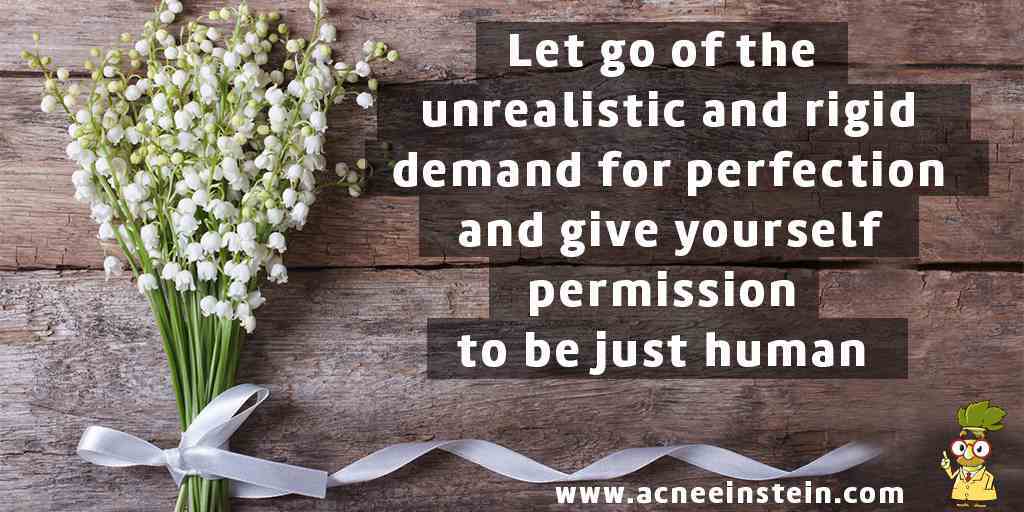
Unloading these toxic thoughts and ideas from your head is perhaps the first step towards true freedom from acne – as opposed to a moment of clear skin accompanied by fear of acne coming back.
Let go of the unrealistic and rigid demand for perfection and remind yourself that you are just a human, flawed perhaps, but just as deserving of love and respect as anyone else. That, my friend, is the essence of self-compassion and why you cannot be truly free from acne without it.
How to start down the road of self-compassion
Practicing self-compassion can be one of those things that is “easier said than done.” However, here are a few tips to get you started down the road to practicing self-compassion and thus, reducing your stress levels and feeling a bit better about yourself and your place in this wide world that we all live in—acne and all.
Be as kind to yourself as you would to someone else
If you saw someone else in emotional turmoil because he or she had acne, would you berate that person? Would you point out how flawed he or she is, how “broken” and “toxic”? Or would you feel empathy for that person and want to extend kindness and comfort to him or her?
No mirrors challenges work because they reduce the toxic hate people keep pouring on themselves
When you take a look at yourself in the mirror, take an objective view; look upon yourself the same way you would look upon another person. Remember, you deserve as much kindness as anyone else in the world, so start by being kind to yourself.
You’ve probably seen those “no mirrors” challenges talked at acne sites and forums. The idea is to avoid looking into mirrors for a week or two. You can probably now understand why these challenged work. Not because mirrors are inherently evil, but avoiding them reduces the toxic hate you keep pouring on yourself.
Become mindful
Be aware of your emotions as you experience them. Obviously, when you feel sad you will be quite well aware that you are sad—but try observing the sadness (or other emotion) through an objective lens. Acknowledge the emotion as you feel it move through you, and try to separate yourself from it so you can view it in a way that isn’t catastrophically reactive (or, conversely, overly minimizing the emotion you are experiencing). Practicing emotional mindfulness is part of becoming truly self-aware, and is an important part of learning to practice self-compassion.
Shift your focus
Rather than constantly striving for self-improvement, shift your focus to self-growth (Grayczyk). Stop worrying endlessly about “fixing” yourself, and work on branching out and growing as a person.
After all, if you’re not broken, you can’t be fixed—but you can continue on a path of personal growth. Like a tree, a person’s growth involves many components, including pruning away the bad and nourishing the good. Start looking at your life from the standpoint of desiring growth and expansion of the self, rather than trying to cure or fix perceived problems.
Remember that you, too, are human
It’s okay to acknowledge that you have flaws. Ignoring flaws won’t make them disappear any more than obsessively focusing on them will (Neff, Why Self-Compassion Trumps Self-Esteem, 2011).
You are not some awful anomaly that stands alone, you are one of billions of flawed individuals making up the entire human race
Just remember that you are flawed—and so is everyone else in the world with whom you share a “common humanity.” You are not some awful anomaly that stands alone, you are one of billions of flawed individuals making up the entire human race. Embrace your humanity, embrace being part of this big, flawed “all,” and acknowledge your flaws… and then accept them.
Life is not black-and-white
Life, in general, is not something that is painted in black-and-white, but rather, many shades of grey and myriad other colors in between. Nor should your mindset be strictly mired in black-and-white thinking. Rather than viewing yourself in terms of “success versus failure” or “worthy versus unworthy,” think of yourself using a different measurement device: think of yourself as successful enough, worthy enough. You don’t have to choose between being at the pinnacle or being at the bottom—it’s perfectly okay to be somewhere in between, as that is where most people realistically are in their lives. Find your “happy medium,” and accept that it’s possible to be good enough without living up to an unrealistic ideal of perfection.
It’s possible to be good enough without living up to an unrealistic ideal of perfection
Humans are complex creatures. Each and every one of us has our strengths and weaknesses. An actress may be attractive but at the same time self-absorbed. Being attractive doesn’t make her a good person just as self-absorbed doesn’t make her a bad person. Similarly, having acne doesn’t make you worthless, loser or useless.
As complex creatures, humans can’t be reduced to such cardboard caricatures.
Give meditation a chance
Consider working time for meditation into your life on a regular basis. By taking the time to reflect and consciously “let go,” you can help to develop your self-compassion and thus, reduce your stress levels. The reduction in stress and increase in self-compassion can aid in reducing skin breakouts, as well as making your life a happier one overall. You can follow a guided meditation plan or create a meditation plan tailored just for you; take the course you think would be best suited for yourself.
Once on the path, stay the course
Once you’ve started down the path to self-compassion, stay the course. If you find yourself falling back into old patterns of thinking and behaving, be mindful of it and acknowledge it, and then let it go and get back on track. Remember, it’s not possible to practice self-compassion while simultaneously berating yourself for your lack of self-compassion!
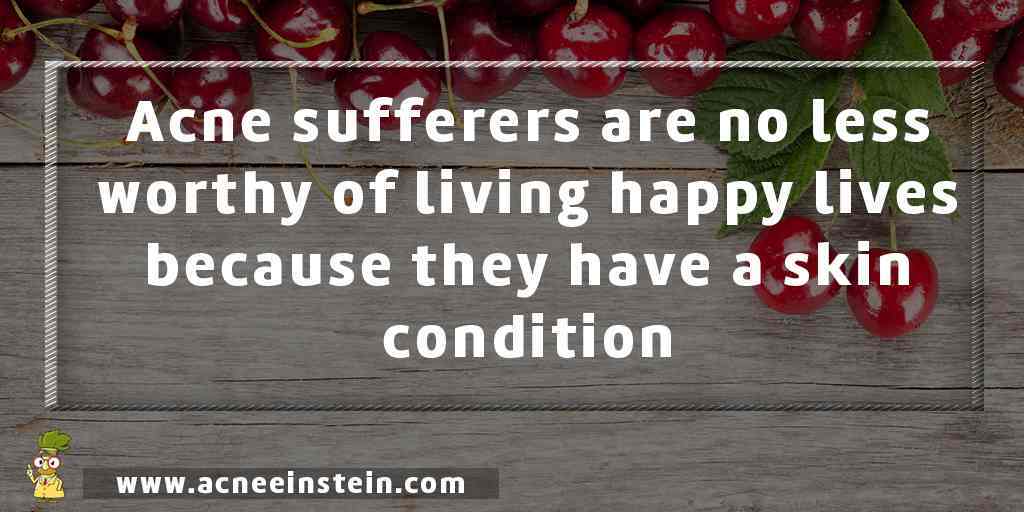
Keep being kind to yourself and making the effort to both grow as an individual, and to embrace your place as a drop of water in the ocean of humanity. No one is perfect, so treat yourself the same way you would treat other people and reap all the rewards that self-compassion has to offer.
Having acne is a part of the human condition, and if you can accept it and start being as kind to yourself as you would to someone else in your situation, you’ll be better off
Instead of looking in the mirror and feeling dread and embarrassment when you see acne on your face or body, remember that you are not alone—many people have acne, and they are no less worthy of living happy lives because they have a skin condition. Having acne is a part of the human condition for a large number of people, and if you can stop focusing on what you see on the surface and start being as kind to yourself as you would to someone else in your situation, you’ll be better off.
When you feel self-criticism arise over your acne, put a stop to it—because all the self-blame and the feelings of shame and embarrassment do nothing but cause extra stress for you. All that extra stress you place on yourself by being overly critical of yourself and your acne is useless, and could even lead to more frequent or more severe breakouts. A stressed body is a breakout-prone body.
If you find yourself lost in despair when you see your acne, pause for a moment and tell yourself this: “I am not the first person to have acne, nor will I be the last. I will not let my acne stop me from living my life, because life has many facets and is so much more than skin deep.”
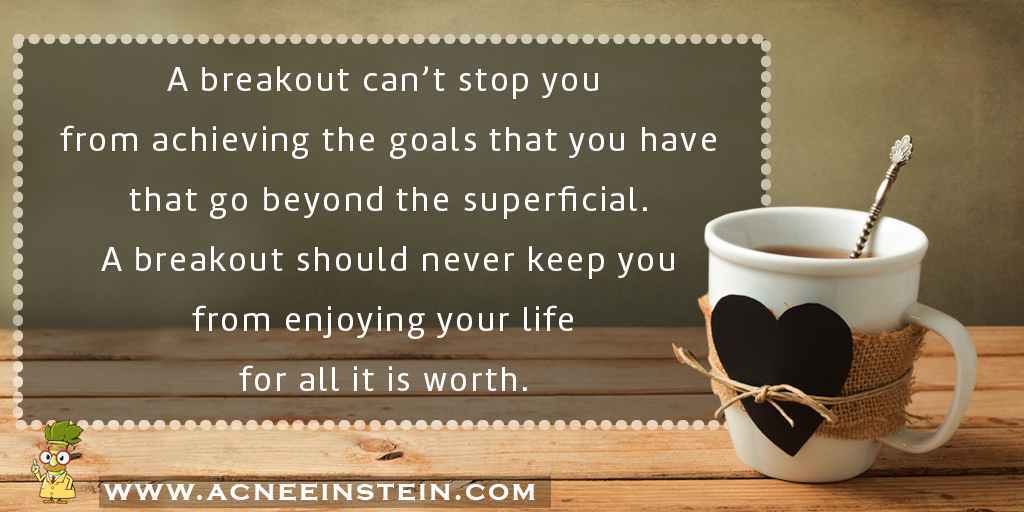
Do not get caught up in catastrophizing—acne is uncomfortable and can be an inconvenience, but breakouts are not the end of the world. A breakout can’t stop you from achieving the goals that you have that go beyond the superficial. A breakout should never keep you from enjoying your life for all it is worth.
When you find yourself slipping into a place of self-blame and allowing your acne to negatively impact your self-image, ask yourself: “What would I say to a friend who was feeling bad about a breakout?” And then tell those things to yourself—because being compassionate toward yourself means being a good friend to yourself, and treating yourself just as you would treat another person who is walking the same road you are.
Stop trying to fix your skin with fad diets and expensive ointments that aren’t effective and instead, fix your mindset. Become as empathetic toward yourself as you would toward any other person who has acne.
Don’t view self-compassion as being similar to self-indulgence or self-absorption. The truth is that the obsessive focus on a common skin condition is far more self-absorbed than taking the time to be kind to yourself.
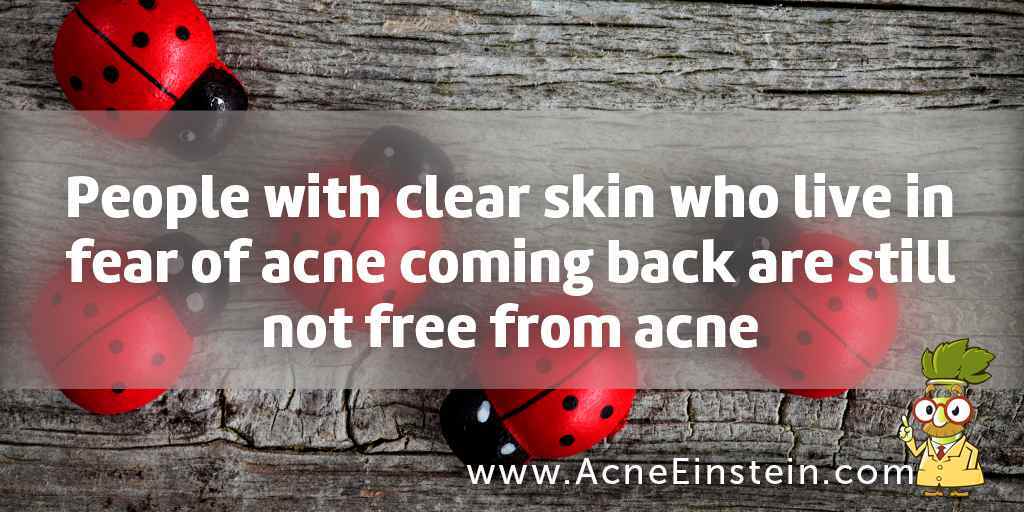
Indeed, by being self-compassionate through mindfulness, accepting your humanity (and remembering that all humans have surface flaws), and treating yourself the same way you treat others, you can step away from a self-focused mindset obsessed with physical appearance and begin to heal in both body and mind. Once you let go of the stress that comes with berating yourself over your acne, your skin and your psyche will both thank you.
You can only be free from acne when you refuse to allow it to control your life. People with clear skin who live in fear of acne coming back are still not free from it. That’s why self-compassion, and giving yourself a permission to be just human, is the only path to true freedom from acne.



This is my favorite article on the whole website. Self compassion is a beautiful concept for anyone struggling with self-image issues. You really outlined a great way to find self-compassion.
The other way that worked for me is to take the plunge into the negative when an episode of skin hopelessness hits. At a moment of complete self-hate and desperation about my skin about half a year ago, I went up to the mirror, and I imagined that this is a world where any physical feature I have is permanent. Someone somewhere waved a wand and I will only ever look like I look today.
In that scenario, it hit me that if this problem is nothing I can fix, I might as well not worry about it. It would be *self-compassionate* to ignore what cannot change and go out to do the things that make me happy. In that world, I’d just give up on my skin. Just imagining that felt like a huge relief, so I decided to do it even in our ever-changing, ever-developing reality. I gave up on my skin and felt happier. And then of course it cleared up. Until I got an allergic reaction (that’s a story for another day). And then it cleared up again.
Sometimes if you feel like you’re pushing against a wall and it doesn’t budge. . . It’s just kinder to yourself to give up and do something else for a while. Then all of a sudden you find a door that was there all along.
Glad to hear that you liked the post. And thanks for sharing what worked for you. Developing self-compassion is not easy, so it’s always interesting to learn what worked for other people. I especially like the scenario where you image you can’t get over acne and force yourself to abandon the “I need to do more” rat race.
I really needed to read this today. I know my genetics and hormones are the cause of my moderate-severe acne, and yet as I was looking at some new pimples in the mirror this morning, I couldn’t help blaming myself. I’m vegan, take supplements, don’t wear face makeup, and stay active and relaxed with yoga, but the acne keeps coming. It begs the frantic question, “What am I doing wrong!?” At some point, when you’ve tried all the “right” things with no success, you just have to let it go and love yourself anyway. Of course, that’s another journey all on its own, and I have a feeling I’ll be coming back to this post for inspiration. Thank you for this website and all that you do.
Thanks for sharing your experience, Jasmine. Not sure what you are eating, but many vegan foods contain soy. Phytoestrogens aren’t that great for women with hormonal-type acne. So if you haven’t already, consider cutting phytoestrogen-rich foods from your diet; namely soy, flax and sesame seeds.
In the realm of health, we’re often obsessed with what we are putting in our bodies and how we are treating our bodies in terms of physical exercise and rest; we don’t give nearly as much consideration to how we are managing our thoughts. So thank you, Seppo, for reminding us that loving who we are, despite our challenges, may be the most powerful tool we have.
Hi Seppo,
I always been reading your posts and I found this one particularly spoke to me.
I have always been a sufferer of acne, first physical, then psychological. Although now I breakout less often and less severely, I am still trapped in thinking, “I have terrible acne skin and it’s only a matter of time it will start to break out again”. Unsurprisingly, one single breakout is enough to ruin my week. I detailed my experience in the link below, with pictures:
https://www.acne.org/messageboard/topic/352759-pictures-body-image-how-clear-is-considered-clear/
I’m currently seeing a therapist regarding my body image, which has helped some what but not quite. I keep equalizing self-worth with clear skin.
It would be lovely if I can free myself from poor body image some day.
Thanks for reading 🙂
Glad to hear that you liked the article, Hannah. I think getting negative emotions and thoughts ‘under control’ is one of the best things anyone with acne can do for themselves. It may or may not help your skin (I suspect it will) but it will make you feel better about yourself and gets rid of some of the emotional pain acne brings about. Various cognitive therapies help, I like REBT. But as someone in the acne.org discussion shared, sometimes you need to take antidepressants. Depression and other dysfunctional emotions are sometimes caused by chemical imbalances in the brain.
Best of luck on your journey!
This was beautiful and something I’m working on. I started asking myself “What would someone who loved themselves do?” when I’m trying to make a decision. I didn’t come up with it, but it helps & meditation is awesome too.
I have struggled with the “toxic” thing in the past too. It is an extremely toxic mindset! lol Food is meant to be enjoyed not obsessed over.
Acne sufferers need a huge dose of self compassion. Me included.
Agreed! Thanks for sharing your tip.
Seppo, I have been a long time reader and I must say this was, in my opinion, one of the most inspiring articles you’ve ever written. Truly, I needed this as I was in one of my times of desperation. Please continue your work as it is both very beneficial and sincerely appreciated.
Glad to hear you liked this, Cameron.
This made me cry hard. Especially the sentence “and a refusal to socialize until the ideal for perfection has been attained.” This is what i am doing to myself. I withdrew from life till ‘i am better’. But instead i’m getting more miserable by the day. Now i’m not only ugly from the acne but the misery has gotten into my face. And into my body. It’s more of a downward spiral here.
Thus i so needed to read this to kick my ass. Well okay, kiss my ass haha! But really, thank you Seppo. XO
I really glad to hear you got the kiss you needed from this post 🙂
Hi Seppo, thanks for this post. I am just discovering you blog 😀 I truly enjoy it because it showed me that I don’t need to be perfect and that if I am doing everything that I possibly can and still break out, that is OK. I have been reading other blogs and I kept getting this feeling that I need to do more, more testing, more cleansing, more supplements. But I finally realised I need to let go more than anything else. Which is extremely hard since our mind tells us we need to put all of our energy into getting rid of acne or obsess over it and that if we let go, things will get worse. But I guess that’s not true. Life with chronic acne is very hard, especially when you have clear periods, then you break out again what is happening to me alot. And it has gotten to a point where I feel extremely depressed about it and it’s controlling my life. I guess this post inspired me to let it go and just focus on my health and starting to grow as a person again.
Glad to hear you liked the post. I wrote it especially for people who are in your situation. It bears to keep in mind that acne is not your fault, and it doesn’t mean you are toxic or broken. There are certain dietary and lifestyle changes one can make to reduce acne, but it doesn’t mean you would be toxic. Due to our genes we just happen to be more sensitive to dietary inputs other people have no problems with.
Ironically, letting go could be one of the best things you can do for your skin.
What a wonderful read. 17 years of recurring acne and the single best thing I have done to help is to change my mindset about it. Roaccutane, 6 different contraceptive pills, paleo, veganism, all the topicals, read all the sites and blogs…. All that obsession, worry, paranoia, judgement, anger. It makes me sad to look back and think how it all took over me. The mind is the key. I still get breakouts but i shrug and remember that it’s been worse – and it will get better. And it does. Simplify your diet, regime, and attitude towards it, and think about how much youve learned, not failed. Thanks for this post! Xxx
Happy to hear you found the post useful. I also think that shifting the mindset and getting rid of the toxic quilt is one of the most important things for people who have lived with acne for a long time.
Thank you for this article. This is the most inspiring article I have ever read. I identify to everything you have written. I’m 26 years old and have spent the last 4 years refusing to socialize, except going to work, because of acne. I have lost all of my friends and previous partners because of this. I used to be extremely confident and sociable person but in the last couple of years have been reduced to extremely low self-esteem, self hate and chronic depression.
I have tried absolutely everything elimination diets, various other diets/lifestyle changes, lotions, potions, pharmaceutical medicine, natural medicine, cardio, cutting cardio, various exercise programs, stress management, extremely restrictive diet that have caused me to have eating disorders for many years..
I have never read an article relating to acne that has touched the core of my being. I really needed to hear this! Thank you!!
best advice i have ever read about dealing with acne. it is filled with wisdom that applies not only to people struggling with acne but to anyone struggling with body image issue. you should consider turning it into an article for a mainstream health magazine such as prevention. so many people would benefit from reading it.
Absolutetely amazing post! There is another side of this self-hate and being acne-centric: brutally squizing out every small skin imperfection in magnifying mirror – not only producing more stress and visious cycle, but also directly causing more acne/scars. Never read anything really helpfull about that, but you nailed real reason whitout even mentioning it. Without self-compassion and personal growth work you write about, every “no mirror” chalenge ends by going back to destructive behavior. Thank you again!
I think self-compassion and learning to accept yourself – regardless of whether you still have acne, is one of the most liberating things anyone with acne could do for themselves. Alas, most people refuse to even entertain the idea and just want to fix their skin.
Hi seppo I really find this article a beam of light for me and thousands others. As a matter of a fact , acne greatly effects the way we live. I tried every thing from the topical ointments to the severe adaplene and isotretinoin . The benefits were for the time being and later it starts again. But one thing which unexpectedly changed in the course of 3 to 4 monts is that my skin has become very dry from a super oily skin resulting in less breakouts but still my acne vulgaris isn’t going away completely. Maybe due to some gut problem because I feel like a burning sensation and digestive problems sometimes in my stomach. Whatever but your article today was a great help.